Most U.S. adults express positive views about America’s openness to people from around the world, the new Religious Landscape Study (RLS) finds.
This is true across the religious spectrum. Upward of half of members of all major U.S. religious groups – and majorities of people at all levels of religious engagement – say “openness to others from around the world is essential to who we are as a nation.”70
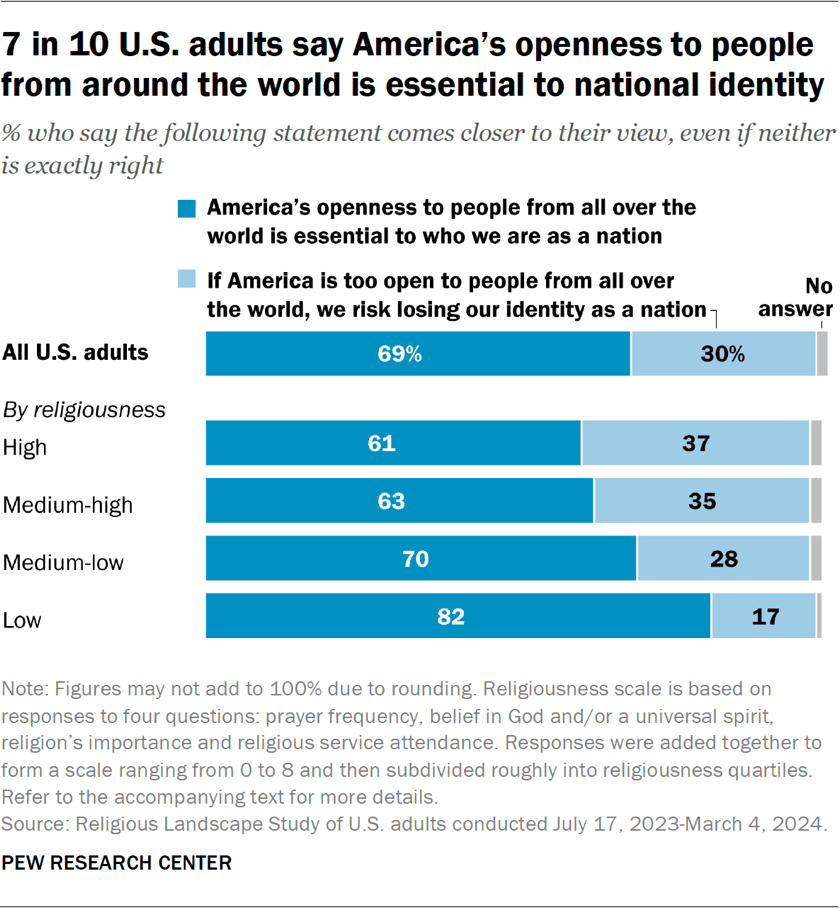
But the public is more divided over whether a growing population of immigrants has been a change for the better, a change for the worse, or hasn’t made much difference.
On this question, the most common view among highly religious Americans is that increased immigration has been a change for the worse. By contrast, the most common view among Americans with low levels of religious engagement is that increased immigration has been a change for the better.
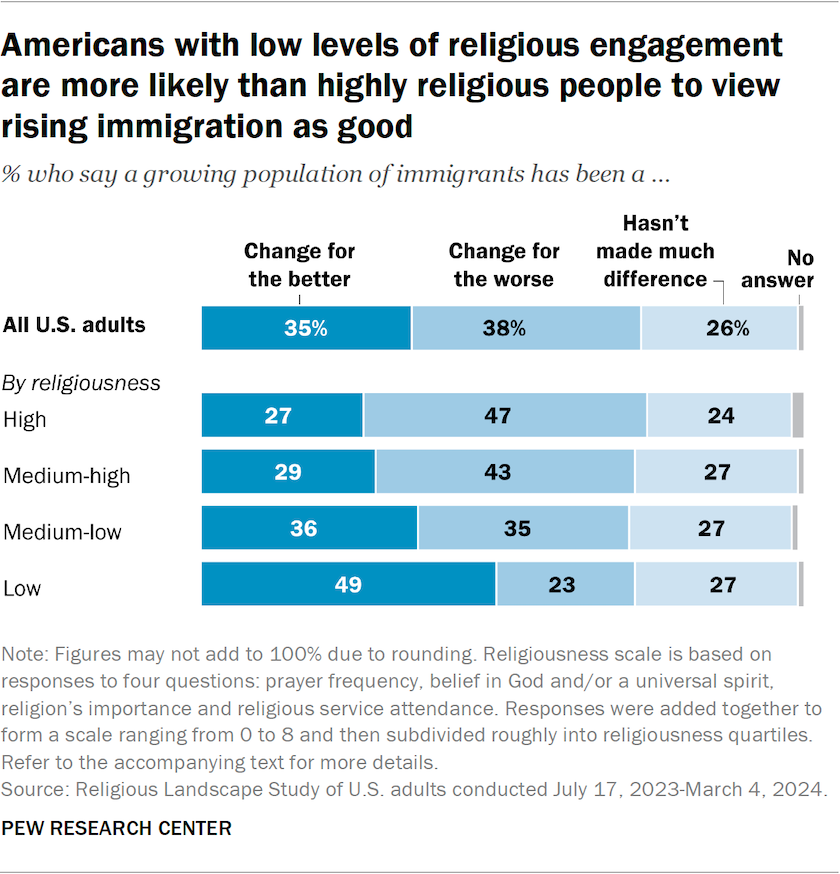
This chapter explores how Americans in different religious groups and with different levels of religious engagement answer survey questions about immigration, racial and ethnic diversity, and religious diversity. But readers should bear in mind that other factors – such as race and ethnicity, political party identification, education and age – also underlie public opinion on these questions.
For example, Republicans and those who lean toward the Republican Party are far less likely than Democrats and Democratic-leaning Americans to say the country’s openness to newcomers is essential to who we are. And Republicans are far more likely than Democrats to say that the growing population of immigrants has been a change for the worse.
Highly religious people are more likely than those who are not religious to be Republicans or lean toward the Republican Party, while people who are not religious are more likely to be Democrats and Democratic leaners than are highly religious people. (For more on the connection between religion and partisanship, refer to Pew Research Center’s “Changing Partisan Coalitions in a Politically Divided Nation.”)
The new survey also shows that the connection between religiousness and views on these topics varies across racial and ethnic groups.
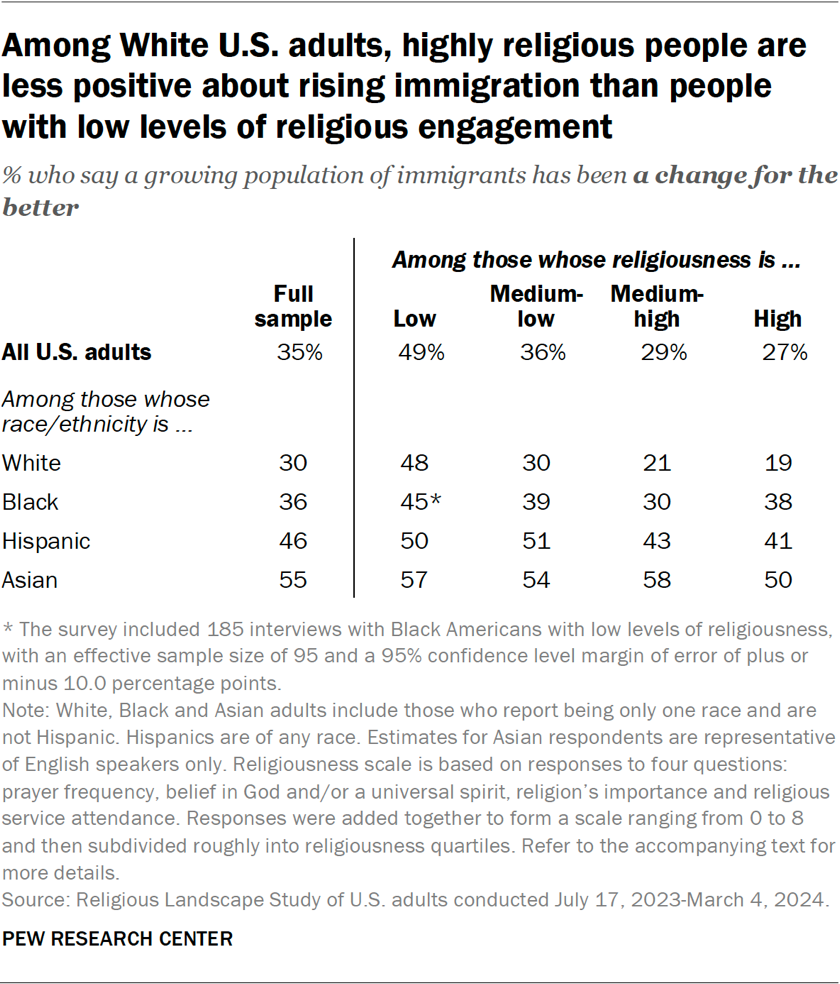
For example, among White Americans, highly religious people are 29 percentage points less likely than those with a low level of religious engagement to say that a growing population of immigrants has been a change for the better (19% vs. 48%). But among Hispanic Americans, the gap is only 9 points, and among Black Americans and Asian Americans, it is 7 points.
When asked about the country’s racial and ethnic diversity, majorities in all the religious categories analyzed in this report and at every level of religious engagement say the fact that the United States is made up of people of many different races and ethnicities strengthens American society.
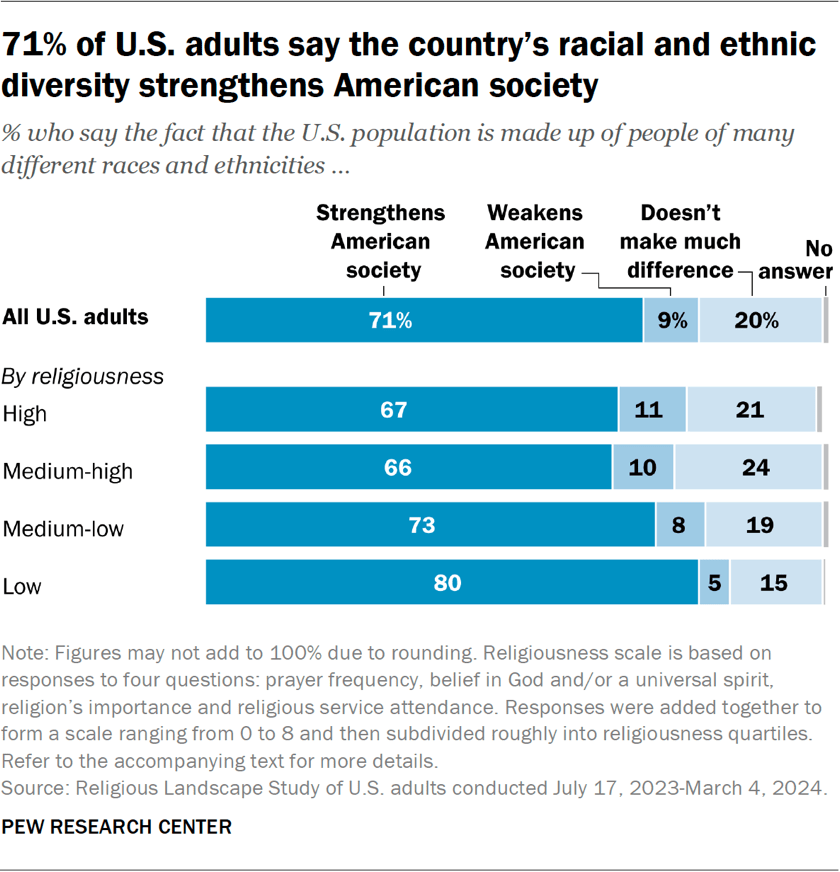
Here again, though, highly religious Americans are somewhat less likely than those with low levels of religious engagement to express a positive view of the country’s diversity.
In response to a separate question, 52% of Americans say the country’s religious diversity (including people who are not religious) strengthens society, while 18% say religious diversity weakens society, and 29% say it doesn’t make much difference.
Read on for more information about how U.S. religious groups answer questions about:
- America’s openness to people from around the world
- America’s growing immigrant population
- Whether racial diversity strengthens or weakens society
- Whether religious diversity strengthens or weakens society
Views on America’s openness to people from around the world
Most U.S. adults view America’s openness to people from all over the world as essential to who we are as a nation.
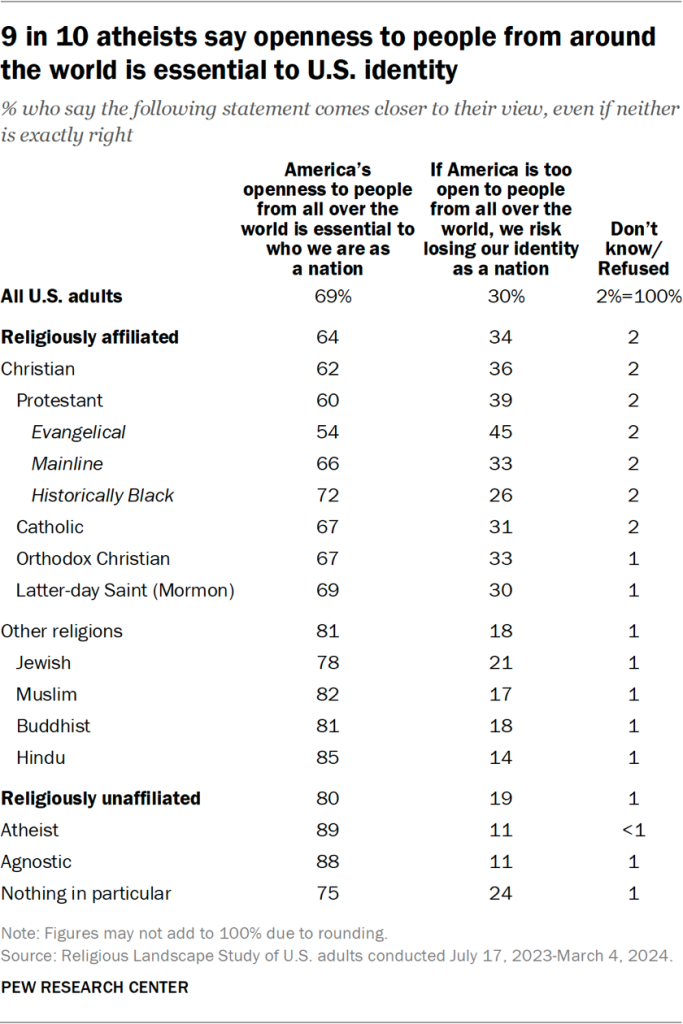
Likewise, upward of half of people in every religious group in this analysis view America’s openness as essential to the country’s national identity.
Atheists (89%) and agnostics (88%) are among the most likely of all groups to say that the country’s openness is essential.
Americans who identify with non-Christian religions are more likely than Christians to view America’s openness to people from all over the world as essential to the country’s identity (81% vs. 62%).
Evangelical Protestants are more divided compared with other religious groups. Just over half of evangelicals (54%) say “America’s openness is essential to our identity,” while just under half (45%) say that “we risk losing our identity as a nation if America is too open to people from all over the world.”
Views on America’s growing immigrant population
U.S. adults as a whole are split on whether a growing population of immigrants has been good for the country (35%), bad for the country (38%), or not made much difference (26%).71
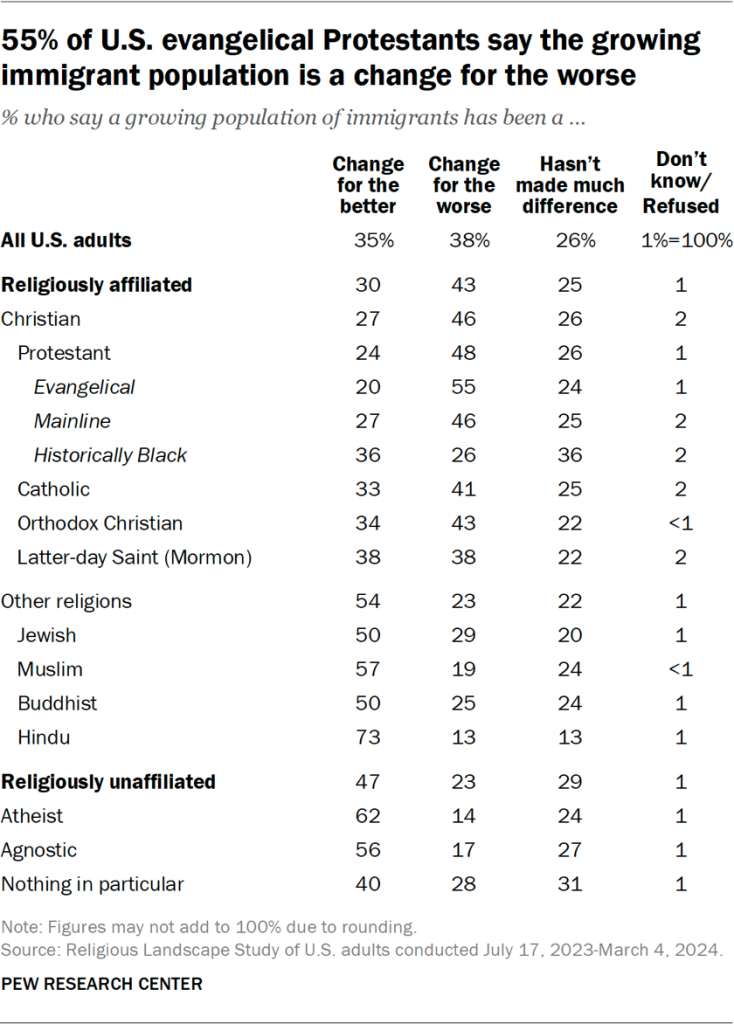
Christians (46%) are twice as likely as Americans of other religions (23%), and twice as likely as those with no religion (23%), to say that a growing population of immigrants has been a change for the worse.
More than half of evangelical Protestants (55%) take this position.
Members of the historically Black Protestant tradition are notably less likely than Christians as a whole to view immigration negatively (26% vs. 46%).
In the U.S., about half or more of Buddhists (50%), Jews (50%), Muslims (57%) and Hindus (73%) say that a growing population of immigrants is a change for the better. (Hindus, Muslims and Buddhists in the U.S. are largely composed of first-generation immigrants.)
A majority of atheists (62%) and agnostics (56%) also view the growing immigrant population as a change for the better.
Views on whether racial diversity strengthens or weakens society
Seven-in-ten U.S. adults – including majorities in all religious groups analyzed – say the country’s racial diversity strengthens American society.
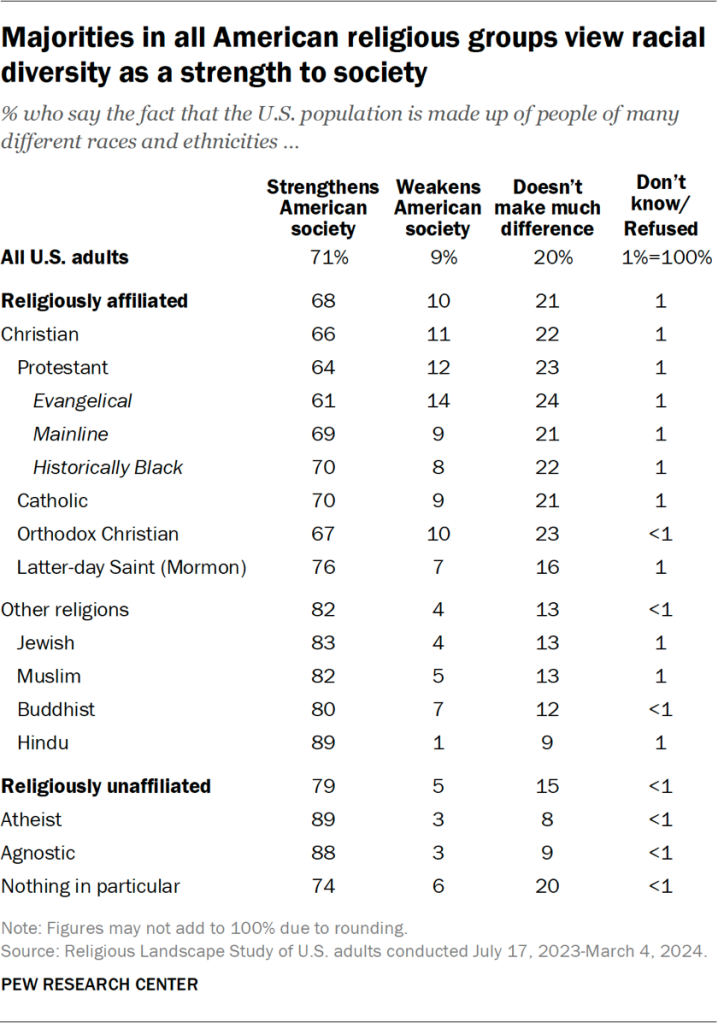
Atheists (89%) and agnostics (88%) are among the most likely to view racial diversity as a strength.
Eight-in-ten or more Hindus, Jews, Muslims and Buddhists also say the country’s racial and ethnic diversity strengthens American society.
Among Christian groups, the share saying the country’s racial diversity is a strength ranges from 61% among evangelical Protestants to 76% among members of the Church of Jesus Christ of Latter-day Saints (widely known as Mormons).
Views on whether religious diversity strengthens or weakens society
Overall, 52% of U.S. adults say the fact that the U.S. population is made up of people from many different religions, including people who are not religious, strengthens American society.72
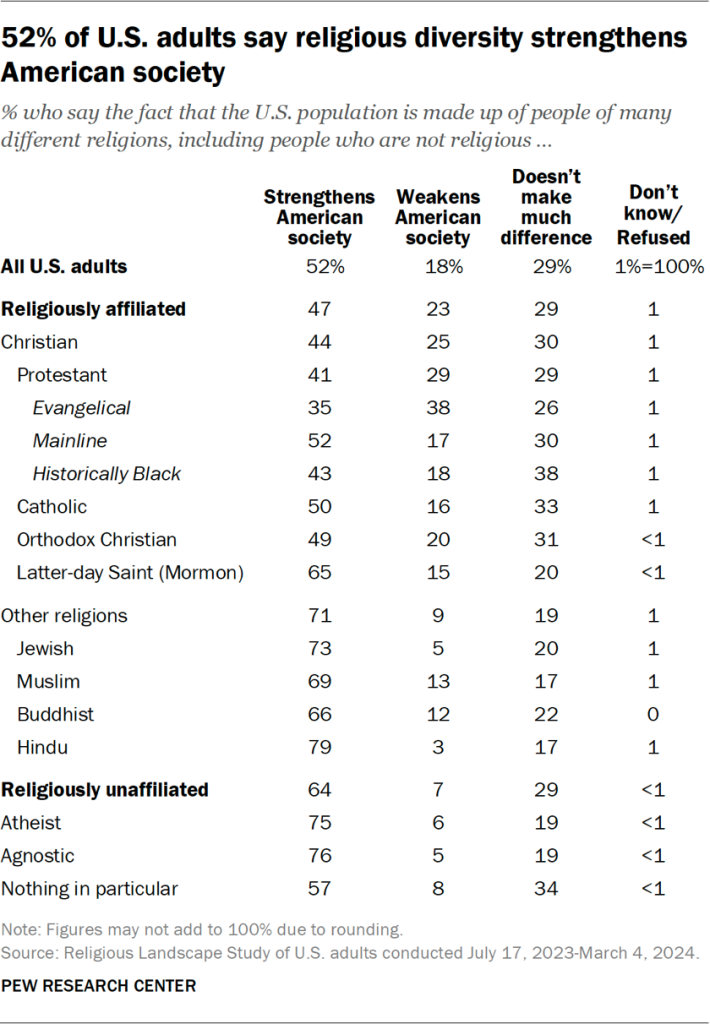
This view is especially common among atheists (75%) and agnostics (76%), as well as U.S. adults who identify as Jewish (73%) or Hindu (79%).
Latter-day Saints are more likely than other Christians to view religious diversity as strengthening society. Latter-day Saints are themselves a minority religious group in America, making up roughly 2% of the population.
Evangelical Protestants (38%) are notably more likely than other religious groups to say the country’s religious diversity weakens American society.




